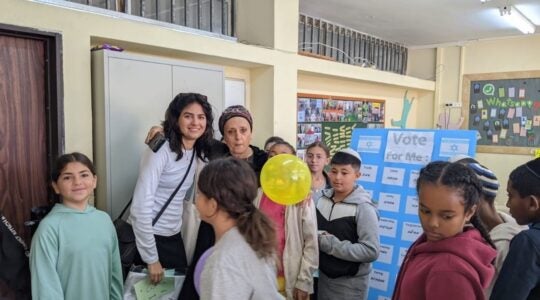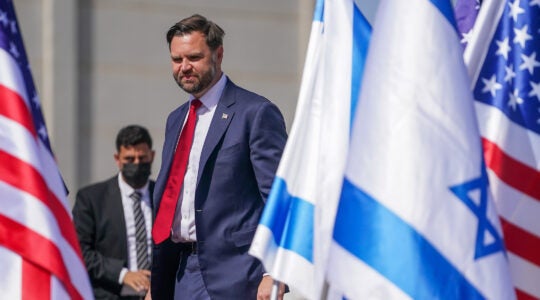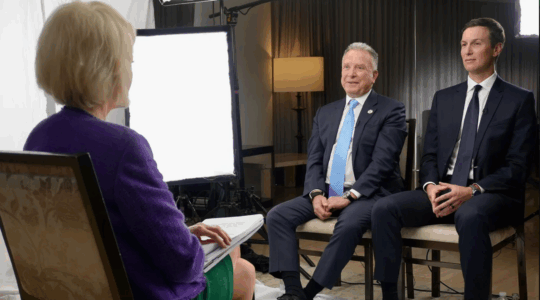I have come here to discuss the future. I do not intend to avoid serious, in-depth and responsible discussion on what has occurred, on what has failed and primarily on what was achieved. This discussion has its place, and I will take part in it as I promised – without cover-up, without vagueness and without evasion.
I will respond with reserve and with deliberation because I believe that responsible leadership includes accepting relevant criticisms, placing in the proper perspective within the entire scope of things, internalizing part of it and moving on.
To summarize 2007, I would like to mark a fact that is clearly felt today by the broader public in the country. It is quiet in the North of Israel.
There is no daily friction and no firing of missiles or Kassams. It has not lasted one day nor one month, but rather 18 long months. This is the longest period of quiet experienced in northern Israel in over 25 years. The north is blossoming and flourishing. No one is happier than I am about this.
There is no doubt that Hezbollah has greatly reinforced the number of weapons at its disposal. They are as numerous as they were on the eve of the 12th of July, 2006. Hezbollah has more rockets, more missiles and more weapons, some new and dangerous, which were given to them by Iran and Syria. However, were it not for the fighting in July and August 2006, would they have any fewer weapons? Would Hezbollah be weakened? Would it lack the tools of war? Would they have fewer missiles?
The unarguable fact is that Hezbollah is not deployed along Israel’s border in the north; its fighters do not come into contact with our soldiers, and not one Hezbollah missile or rocket has been fired toward Israel for a year and a half. For the first time, the Lebanese army is deployed on the border with Israel. For the first time, there is an effective international force serving as a buffer between ourselves and Hezbollah.
Is this the best situation we could have expected? Not necessarily. Could this situation deteriorate into renewed fighting? This is a possibility which can never be voided in the reality of the Middle East. However, one thing is clear – the present situation is inestimably better than it was in the past. There is quiet and security for the residents of the north. The north is blooming and prospering. However, the boys have not yet returned home. I do not forget that for one moment.
If the quiet prevailing in the north would prevail today in the southern part of the country, would we be occupied with a daily counting of the number of rockets and missiles which would be hoarded there in storerooms?
If for 18 months not one Kassam missile had been fired in southern Israel, would we be criticizing the political leadership, the security system, the IDF fighters and their commanders, as some have enjoyed doing, with such intense passion, following the events in the north?
The question is not the number of rockets and how many missiles our enemies possess. They possess more than we would like and these weapons are not intended as fireworks. There is no dispute regarding this.
However, the decisive question is, how enthusiastic are they to use these weapons? How badly do they want to use them in the north of the country?
The facts speak for themselves.
There is no firing. For a year and a half, there has been quiet. This is not coincidental. It reflects the strength of the State of Israel’s deterrence toward Hezbollah and toward all those equipped with long-range weapons, including rockets and missiles in that region of the country.
Deterrence is not measured in the number of decibels of statements made in town squares. We are not competing in this arena – not with our enemies, and, not to mention in the same breath, nor with our political rivals in this country’s democratic system.
One thing is known, clear and understood, not only to a number of confidants in the security system and the top political echelon, but also to many residents of the country and leaders around the world: Our enemies in the nare not rushing to fight us. They know why.
The reasons are clearly noticeable; they are in the air; they are felt in the region; they are known to all those who need to know. They reflect Israel’s tremendous strength, and the courage and determination of its fighters, all its fighters, at all levels and at all ranks, privates and company commanders alike. I admire and respect all of them for their bravery, for fighting and for their sacrifices. They were there, and there are those who did not return, and I do not blame them for the criticism, reservations and protests which they express.
And if I have not been clear, I would like to add, from the bottom of my heart: I appreciate and respect the determination and courage, the sacrifice and willingness of our fighters, both regular and reserve, soldiers and officers alike, company commanders and regiment commanders alike. And if anyone posed as my “confidant” and said otherwise, he is not my confidant.
These are the reasons why, in the final tally, after taking into consideration all the events, the disappointments, the failures, the achievements and the victories, I am not sorry for the crucial decisions I led as prime minister – not those related to the fighting in Lebanon and not those related to other events.
Were mistakes made? Yes. Were there failures? Certainly. However, lessons were learned, shortcomings were rectified, patterns of action were changed and primarily: the decisions made since then have led to increased security, more quiet, less terror, more deterrence and increased prosperity for the State of Israel than it has experienced for many years.
The economic situation has improved beyond recognition: imports have increased, foreign investments have grown, the balance of payments is positive, unemployment has dropped below 7 percent, the number of people living in poverty has decreased and the Holocaust survivors are being taken care of as never before. All this is not the result of happenstance, but rather as part of a planned economic policy and the faith of the international community. Living in this country has improved.
While we are occupied with the struggle against terror in the south and strengthening deterrence in the north, the government of Israel is occupied with the continuation of negotiations with the Palestinian Authority. The very existence of diplomatic negotiations always involves internal tension given the extreme sensitivity of the issues on the agenda. It was so in the past, and it is so today – perhaps today more than ever.
Let me say at the outset: there is not, nor will there be, any political, party or personal consideration which will deflect me from the effort of reaching a political arrangement with the Palestinian Authority. I am familiar with all the arguments against negotiations: those which are anchored entirely in personal or party needs and those – although I do not agree with them – which are explained by public considerations which are deserving of discussion.
Even if I cannot commit that a political agreement can be reached with the Palestinian Authority during 2008, we are doing everything in our power to achieve one. The Minister of Foreign Affairs is investing most of her time conducting negotiations with representatives of the Palestinian Authority, headed by Abu Ala.
At the same time, the Minister of Defense maintains ongoing contact with the Palestinian Prime Minister, Salam Fayyad, and with those charged with security in the Palestinian Authority, in order to ensure that Israel’s security interests are not harmed. I am continuing with the round of meetings set with the President of the Palestinian Authority, and naturally these talks are moving forward in the matters under negotiation, and are conducted in a serious, friendly and honest atmosphere. The relations between us are based on trust and credibility. There are many hurdles which overshadow the chances of success of this attempt. Terror obligates us to conduct unceasing operations in Southern
Israel, as well as in Judea and Samaria; the lack of proper economic infrastructures in the Palestinian Authority, the lack of social services, the lack of ruling and judicial systems and the lack of mechanisms for enforcing civil law – all these narrow the Palestinian side’s space to maneuver, and primarily Israel’s space to maneuver.
There are endless arguments why not to invest in the attempt, why the chances are slim, why the dangers are great. I am aware of this. I am familiar with these arguments, excuses and interpretations – and yet, I am fully determined to continue ahead. We have no other way but to conduct peace talks. We have no more promising horizon of hope than the chance to hold dialogue with the present Palestinian leadership.
They say that it is weak and does not have the necessary tools to uphold commitments even if they sign them; they say that in any case they do not rule in Gaza, so what is the point of discussing Judea and Samaria with them. I say that there is no better Palestinian leadership than this one – with this one, we can discuss peace.
I would like to say something personal: for all my adult life in this country, I have been exposed to convincing arguments as to why not. During my ongoing experience in public life, since the beginning of the 1970’s – I was often occupied with presenting arguments as to why we must not make concessions. At all the decisive crossroads during the last 40 years, at points during which we had to compromise – we found backing and support from outside and within as to why it would be preferable not to compromise.
Like many and better than I, I also invested mental energy and sifted through the range of facts that would help me convince myself why it was forbidden and impossible, inadvisable and dangerous.
Now – 40 years later – seeing the unadulterated reality can no longer be avoided. I do not say this in order to invite a collective ceremony of self-flagellation. Our enemies greatly mistook us and engaged in horrendous terror, which has become a way of life. Their obstinacy was unforgivable, and we must wait and see if it has softened, and if they are ready for the historic compromise which is unavoidable. I am not certain it is so, but I am ready and want to try.
Now we must understand that we do not have time. Once we were afraid of the possibility that the reality in Israel would force a bi-national state on us. In 1948, the obstinate policy of all the Arabs, the anti-Israel fanaticism and our strength and the leadership of David Ben-Gurion saved us from such a state. For 60 years, we fought with unparalleled courage in order to avoid living in a reality of bi-nationalism, and in order to ensure that Israel exists as a Jewish and democratic state with a solid Jewish majority. We must act to this end and understand that such a reality is being created, and in a very short while it will be beyond our control.
This does not mean that we will give up our right to fight the Palestinian terror which threatens the security of Israel and its residents’ quality of life, primarily in the South, from the Gaza Strip, but also from Judea and Samaria.
We will continue to strike at the terrorist leaders in the Gaza Strip, and will not hesitate to influence the quality of life of its residents. The decisions of the Minister of Defense regarding Gaza were made with my full agreement and consent. Under no conditions, under no circumstances will we allow for a humanitarian crisis to develop. We will not stop food for children, medicine for those in need nor fuel for institutions tied to saving lives. However, there is no justification or basis to demand that we allow the residents of Gaza to live normal lives, while mortars are fired and missiles are launched from their streets and the courtyards of their homes towards Sderot and the communities in the South.
Does anyone seriously believe that while children here wet their beds at night from fear and are afraid to leave their homes, they will live lives of quiet routine?
I have unequivocally clarified to all the involved parties, first and foremost the President of the United States, but also to our Arab neighbors and to the Palestinians with whom were are conducting dialogue, that we will not accept nor compromise with terror aimed at our citizens. No violent action on our part against the terrorist bodies will be considered a breach of any understanding or agreement.
All possibilities remain open. The stakes are high in the historic opportunity we have ahead of us and it is fraught with danger. However, it exists. It is based: on timing which is unprecedented in the modern history of the conflict between us and Palestinians, of a deserving Palestinian leadership which desires peace with Israel and opposes terror; of a sympathetic international community ready to mobilize for the process and which supports the principles we believe are vital; and of an American president committed to the security of Israel and the unmistakable Jewish character of the country, at a level which is unprecedented in our history.
The cooperation between Israel and the United States is accepted by some among us as obvious. It is not. The level of intimacy in the relations between Israel and the United States, and the depth of their understanding as to the essential needs for the security and future of the State of Israel are unprecedented.
I wish I could share with you several of the details connected to this strategic cooperation, the concern and the almost boundless generosity of the current Administration, with coordination which touches upon the smallest detail of the most decisive issues regarding the future and prosperity of the State of Israel.
It is enough for me to mention the dramatic upgrading of foreign aid which the United States decided to grant us, in the amount of $6 billion, leading to a total of $30 billion over ten years. This aid is the tip of a huge iceberg, which often floats below the surface, the basis of which provide us with a significant layer of protection, backing, support and aid which are essential to us on issues which are inestimably important to us.
These then are the opening facts, in the framework of which we must decide whether or not to take advantage of the special domestic and international circumstances, in order to deal with the magnitude of the hour.
We do not have the right to miss this narrow and fragile opportunity, as dangerous as it is. I have no right to place, even for one second, my political comfort or that of my Government ahead of this narrow fracture which I must penetrate to advance peace.
I do not have the moral right to serve as prime minister of the Jewish people and the State of Israel if I do not take the risks, face all the obstacles and be exposed to the challenges involved in this exciting attempt. Therefore, I have no intention of letting go, no matter the political and personal cost. Believe me, I am experienced enough and keen-sighted enough to see all the ties and collaborations of those swooping in with insatiable political lust on the blood of our sons, of those who assist from within and those who support from outside – and all for the purpose of taking away from our people its chance for a new horizon.
Our people – a people longing for an opportunity of light at the end of the dark tunnels which cloud our joie de vivre – is a wise people. It knows who speaks the truth and who does not. It knows who speaks from the heart and who speaks out of insatiable lust for authority and power.
And it knows that there is no substitute for what I am offering, cautiously and responsibly, but with boundless faith: to return to a reality in which there is no full realization of all our dreams of a large and broad country, but in which there is the chance – perhaps the best ever – of a Jewish, Democratic state which lives in security, peace and with international support and in hope which does not fade.
Thank you.
(Text provided by Prime Minister’s Office)
JTA has documented Jewish history in real-time for over a century. Keep our journalism strong by joining us in supporting independent, award-winning reporting.





